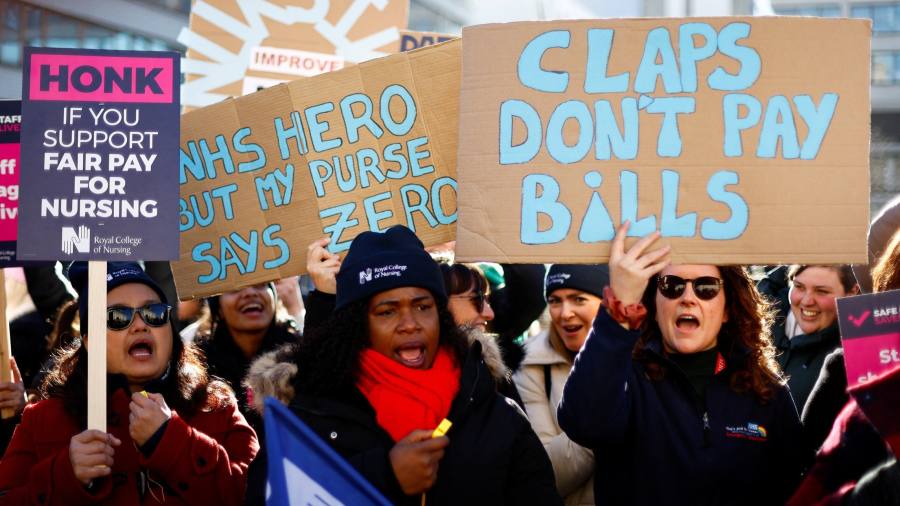Health unions and the government remained deadlocked in their dispute over NHS workers’ demands for higher pay after ministers made clear they would not reopen the wage settlement in England for 2022-23.
As up to 40,000 nurses and ambulance workers in England and Wales walked out on the biggest day of strike action in the health service’s history, health minister Maria Caulfield said “above-inflation pay rises” would fuel the problem of rising prices.
Rishi Sunak, the prime minister, is contending with the biggest wave of strikes in the public and private sectors in decades, with workers pushing for higher pay amid the cost of living crisis.
But after ministers made conciliatory noises to health unions in January, hinting they might reopen the pay settlement for NHS workers in England for the current financial year, they have since hardened their position.
The idea of a £1,000 one-off payment for NHS staff, floated by health secretary Steve Barclay, was blocked by the Treasury. Downing Street did not deny that ministers had not held any serious talks with health unions in recent weeks.
Challenged on whether the government would be willing to the reopen the pay settlement for NHS staff in 2022-23, Caulfield raised the issue of constraints posed by affordability.
“The secretary of state [for health] and the PM have been clear that that would be extremely difficult to do because it wouldn’t just be for nurses . . . There are a range of public sector workers who would also want the same request and across the board you are talking about billions of pounds to pay for that,” she said.
The government has instead pressed unions to engage in discussions about evidence to be submitted to independent review bodies about the pay awards for NHS staff in 2023-24.
But Sara Gorton, head of health for the union Unison, said NHS workers were on strike to improve pay and staffing in 2022-23. “Talking about the wage rise they’re due in April won’t end the dispute,” she added.
The GMB union indicated it was willing to meet Barclay for talks, but only if the pay settlement for 2022-23 was on the table.
Pat Cullen, Royal College of Nursing general secretary, accused the UK government of “punishing England’s nurses”, when the Welsh and Scottish administrations had been willing to negotiate on pay for the current financial year. She urged Sunak to “negotiate and halt this action now”.
The Welsh government’s offer on Friday of improved pay for NHS workers in Wales for 2022-23 prompted the RCN and the GMB, which represents ambulance workers, to call off strikes scheduled for Monday in the principality. Unite, another union representing ambulance workers, proceeded with walkouts.
Sunak’s reluctance to give ground to the health unions risks costing him politically: a YouGov survey at the end of January suggested about two-thirds of the public still supported strikes by NHS workers.
In confirmation that the NHS strikes pose a particular problem for ministers, the same YouGov poll found more people opposed than supported strikes in other sectors, including rail.
NHS insiders said the mood seemed to be hardening among ministers and unions.
The NHS Confederation, which represents organisations across the sector, warned that the health service’s ability to meet a government target to ensure that by the start of April all patients waiting 18 months or more for non-emergency surgery would have been treated, was now hanging in the balance because of strikes.
Credit: Source link














